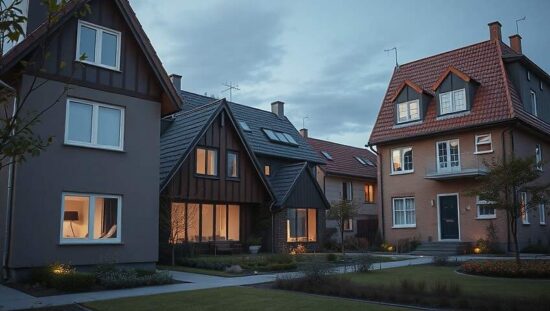Germany’s Housing Construction Slows in 2024
According to the Federal Statistical Office (Destatis), Germany’s housing construction industry experienced a decline in 2024, with a total of 251,900 new dwellings built, a 14.4 percent or 42,500 fewer units compared to the previous year. This marks the first significant decrease in the number of completed dwellings, after a three-year period of steady growth from 2021 to 2023, during which the number of new dwellings rose by 294,000 each year.
The decline was particularly pronounced in the construction of single-family and two-family homes, with 22.1 percent or 15,400 fewer single-family homes and 26.2 percent or 6,300 fewer two-family homes built compared to the previous year. In contrast, the number of new dwellings in multi-family homes, the most common and often company-built type, decreased by 13.4 percent or 21,000, while the number of new dwellings in residential homes for the elderly increased by 17.6 percent or 1,300.
In terms of the type of builders, the number of new dwellings constructed by companies decreased by 11.8 percent or 15,100, while the number of new dwellings constructed by private individuals decreased by 20.4 percent or 24,500. The number of new dwellings constructed by public entities decreased by 20.5 percent or 2,500.
The average time it took to complete a new dwelling, from the issuance of the building permit to the completion of the construction, increased to 26 months in 2024, up from 24 months in 2023 and 20 months in 2020.
The average living space per new dwelling decreased to 96.2 square meters in 2024, continuing a trend of smaller dwellings, with the largest average living space per dwelling recorded in 2007 at 116.4 square meters.
The number of building permits issued for new dwellings decreased by 17.1 percent to 215,300 in 2024 and the backlog of approved but not yet completed dwellings, known as the “construction overhang” decreased by 67,000 to 759,700 dwellings at the end of 2024. Of these, 330,000 dwellings were under construction, with 179,200 already in the final stages of construction.
The decline in the construction overhang is also attributed to the high number of expired building permits, which typically have a multi-year validity period. In 2024, 29,000 building permits expired, the highest value since 2002 and an increase of around a quarter compared to the previous years (2023: 22,700; 2022: 22,800).
Non-residential building activity, including factories, warehouses and office buildings, also declined in 2024, with the total floor space of new non-residential buildings decreasing by 7.3 percent to 177.7 million cubic meters. The decline was particularly pronounced in the construction of retail and warehousing facilities, with a 20.3 percent or 12.9 percent decrease, according to the authorities.





